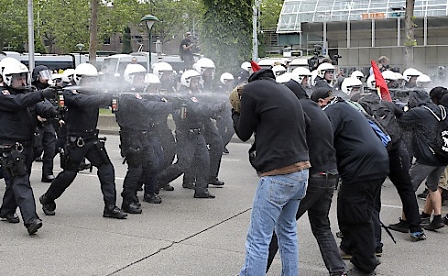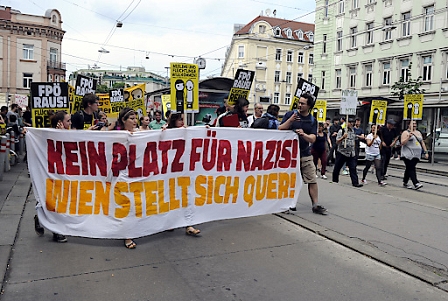Erstellt am: 13. 6. 2016 - 14:38 Uhr
Vienna police under fire
FM4 Reality Check
Hear the programme in the FM4 Player or subscribe to the podcast and get the whole programme after the show
The Vienna police are coming under heavy criticism for their handling of the far right "Identitären" demonstration on Saturday.
Under particular fire is their decision to use pepper-spray against counter demonstrators who were trying to block the march route. It's also being suggested that the police are generally use more force against left wing demonstrators than they to against the far right.
 - Identitären-D_body.jpg)
ORF
On Reality Check, Joanna King asked Bernhard Weidinger of the Documentation Centre of Austrian Resistance for his assessment of the police response.
BW: The role of the police is to safeguard, on the one hand, the right to demonstrate – for the far rightists, in this case, but on the other hand, of course, protesters can opt for means of civil disobedience, and in this case they were trying to block the far right demonstration. And in a case like this, the police has two options. It can opt for either making the demonstration go the route that was intended, by any means necessary, which they obviously opted for, or it could opt for dissolving the demonstration because it will apparently not be possible to take this route without extreme violence.
JK: Videos are circulating that suggest the police used pepper spray against the counter demonstrators before there was violence from the counter demonstration. The police have said there was passive resistance from the counter demonstrators, they themselves couldn’t move forwards. Is it legitimate for something like pepper spray to be used in such a situation?
BW: The question really is, is it more important for far rightists to be able to take their route, or is it more important to not injure an excessive number of people by excessive use of force, which in this case, I would say, was used. In Germany we have seen many occasions on which demonstrations of far rightists were blocked by people, where the police resorted to dissolving the far right demonstration because it didn’t want to resort to excessive violence. The Viennese police, this Saturday, decided to [take a different course].

APA/HANS PUNZ
JK: There’s a photo circulating on social media of the policeman who was in charge of this operation shaking hands with two right-wing extremists, who will have played, of course, an important role in the right-wing demonstration. What’s your view of that?
BW: Well, we know that a large percentage of policemen are leaning towards the political right. We know that because of the elections to the trade unions, and of course, this is something that leaves its mark in the way the police handles demonstrations. We certainly see that the police is more ready to use excessive force against left-wing demonstrators as compared to the far right.
JK: The police in Austria are actually a highly trusted institution, we know that from surveys. So how concerned should we be, for instance to see a photo that suggests that relationship?
BW: I wouldn’t say that the handshake itself – we probably shouldn’t read too much into that. Bit I think that on a symbolic level it says a lot, and really, in the past, demonstrations are handled in a different way [according to] whether they come from the far right or the far left. For example, we had this spontaneous demonstration in the night of Saturday, where the rightists could gather again, and demonstrate again, in the 8th district, and in similar cases in the past where far leftists held spontaneous demonstrations, we would see the WEGA intervening very [quickly], also using force, and this was not the case on Saturday night with the far right.
JK: That spontaneous demonstration, as far as we know, happened because a false rumour was being circulated that one of the Identitären has been badly injured and was in a coma at the AKH, the general hospital. That was a false rumour that was also put about by the FPÖ leader, Heinz Christian Strache. What role should Mr Strache play in such a situation?
BW: We have seen in the past, on many occasions, that the leader of the Austrian Freedom Party does not care too much about the truth of rumours he spreads. We have seen many occasions on which high ranking FPÖ politicians have spread rumours even when they had been proven wrong, and they knew that they had been proven wrong. This is not, of course, a very responsible behaviour for politicians.

APA/HERBERT PFARRHOFER
JK: Going back to the original demonstration, the far right march was prevented from completing its route by the counter demonstration. Can the counter demonstration be criticized in terms of denial of freedom of expression or speech of the far right?
BW: Of course, we have a conflict of interest, and also a conflict of freedoms. The right to demonstrate on the one hand and, well, the right not to tolerate Nazis marching through your town, or through the quarters where you live. And in this case we saw that anti-fascism prevailed in as far as the far rightists were not able to complete the route. I think it was definitely legitimate in this case to resort to this means of civil disobedience in trying to block the far right.
JK: The Neos have suggested that the police should be required to wear some sort of [personal, clearly visible] identification mark, that that might encourage different behaviour, so to speak, from the police, in terms of the level of force the use during protests. What’s your view of that idea?
BW: I think that would definitely make sense, because, of course, it’s easier then to hold individual police officers responsible for their actions, and I guess that should have positive repercussions on their behaviour in policing such demonstrations.
FM4 Reality Check
Monday to Friday from 12.00 to 14.00, Saturday from 12.00 to 13.00, and after the show via Podcast or fm4.orf.at/realitycheck.


